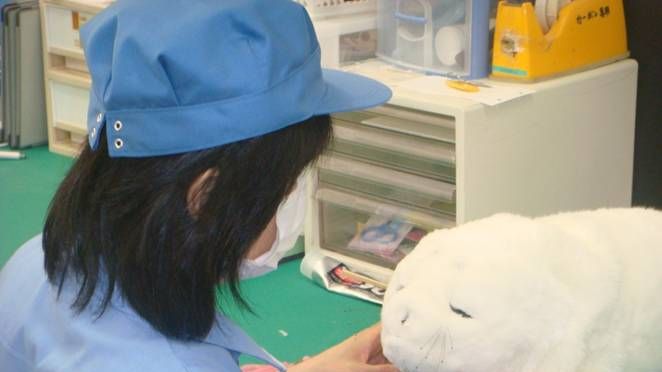
Press release -
Robo-pets may contribute to quality of life for those with dementia
Robotic animals can help to improve the quality of life for people with dementia, according to research.
Companionable robots are enjoyable, interesting and can be used as an intervention to promote social interaction.
Northumbria University’s Professor Glenda Cook has carried out ethnographic work in care homes in North East England introducing PARO – a robotic harp seal – to residents.
PARO is fitted with artificial intelligence software and tactile sensors that allow it to respond to touch and sound. It can show emotions such as surprise, happiness and anger, can learn its own name and learns to respond to words that its owner uses frequently.
Professor Cook said: “When PARO is introduced to residents of care homes it is met with great interest with residents wanting to hold and interact with the robot. Structured discussions are led by a group convener and focus on the participants’ views about PARO and then subsequently about the participants experiences of pets and interaction with other animals.
“Staff members indicate that introducing PARO into the care environment promoted social interaction between residents, and between residents and staff. It was a trigger to start conversations and interactions that did not otherwise take place.”
A study has found that interacting with a therapeutic robot companion made people with mid- to late-stage dementia less anxious and also had a positive influence on their quality of life.
A pilot study, led by Professor Wendy Moyle from Griffith University, Australia and involving Northumbria University’s Professor Glenda Cook and researchers from institutions in Germany, investigated the effect of interacting with PARO compared with participation in a reading group.
Eighteen participants, living in a residential aged care facility in Queensland, Australia, took part in activities with PARO for five weeks and also participated in a control reading group activity for the same period. Following both trial periods the impact was assessed, using recognised clinical dementia measurements, for how the activities had influenced the participants’ quality of life, tendency to wander, level of apathy, levels of depression and anxiety ratings.
The findings indicated that the robots had a positive, clinically meaningful influence on quality of life, increased levels of pleasure and also reduced displays of anxiety.
Research has already shown that interaction with animals can have a beneficial effect on older adults, increasing their social behaviour and verbal interaction and decreasing feelings of loneliness. However, the presence of animals in residential care home settings can place residents at risk of infection or injury and create additional duties for nursing staff.
This latest study by Professor Moyle and colleagues suggests that PARO companions elicit a similar response and could potentially be used in residential settings to help reduce some of the symptoms – such as agitation, aggression, isolation and loneliness – of dementia.
Prof Cook, Professor of Nursing at Northumbria University, said: “Our study provides important preliminary support for the idea that robots may present a supplement to activities currently in use and could enhance the life of older adults as therapeutic companions and, in particular, for those with moderate or severe cognitive impairment.
“There is a need for further research, with a larger sample size, and an argument for investing in interventions such as PARO robots which may reduce dementia-related behaviours that make the provision of care challenging as well as costly due to increased use of staff resources and pharmaceutical treatment.”
The pilot study, entitled ‘Exploring the Effect of Companion Robots on Emotional Expression in Older Adults with Dementia’, is published in The Journal of Gerontological Nursing.
The authors are: Prof Moyle, Director at the Dementia Collaborative Research Centre, Queensland; Dr Cooke, Dr Beatie and Dr Jones, of Griffith University; Research Assistant Ms Gray of the Research Centre for Clinical & Community Practice Innovation, Queensland; Prof Cook, Northumbria University; and Dr Klein, Professor of Organisation and Management in Social Work, Fachochschule Frankfurt am Main, Frankfurt, Germany.
Date posted: June 24, 2013
Topics
Categories
Northumbria is a research-rich, business-focussed, professional university with a global reputation for academic excellence. To find out more about our courses go towww.northumbria.ac.uk
If you have a media enquiry please contact our Media and Communications team at media.communications@northumbria.ac.uk or call 0191 227 4571.







